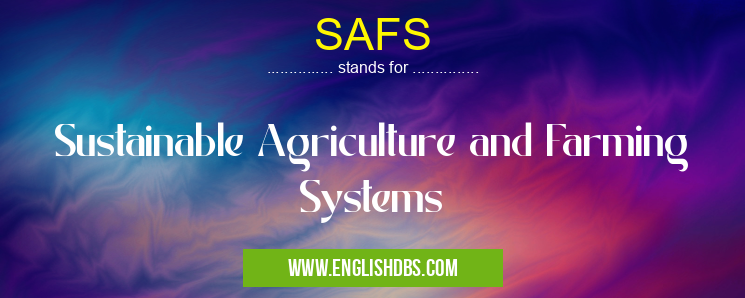What does SAFS mean in FARMING & AGRICULTURE
SAFS stands for Sustainable Agriculture and Farming Systems. It encapsulates practices and approaches aimed at ensuring the long-term sustainability of agricultural systems while safeguarding environmental integrity and economic viability.

SAFS meaning in Farming & Agriculture in Miscellaneous
SAFS mostly used in an acronym Farming & Agriculture in Category Miscellaneous that means Sustainable Agriculture and Farming Systems
Shorthand: SAFS,
Full Form: Sustainable Agriculture and Farming Systems
For more information of "Sustainable Agriculture and Farming Systems", see the section below.
SAFS Meaning
SAFS encompasses a holistic approach to agriculture that prioritizes:
- Environmental sustainability: Minimizing ecological impacts, conserving biodiversity, and protecting natural resources
- Economic viability: Ensuring profitability and financial stability for farmers and businesses
- Social equity: Promoting fair access to resources, improving livelihoods, and empowering communities
SAFS Full Form
Sustainable Agriculture and Farming Systems
What Does SAFS Stand For?
SAFS advocates for practices such as:
- Crop rotation: Alternating different crops in a field to improve soil health and reduce pests
- Integrated pest management: Using natural methods and minimal pesticides to control pests
- Conservation tillage: Minimizing soil disturbance to conserve soil structure and moisture
- Precision farming: Using technology to optimize resource allocation and reduce environmental impacts
- Agroforestry: Integrating trees and shrubs into agricultural systems to enhance biodiversity and soil health
Essential Questions and Answers on Sustainable Agriculture and Farming Systems in "MISCELLANEOUS»FARM"
What is Sustainable Agriculture and Farming Systems (SAFS)?
SAFS is a holistic approach to agriculture that prioritizes environmental, economic, and social sustainability. It aims to produce food and other agricultural products while minimizing negative impacts on the environment and ensuring long-term profitability and social equity.
What are the key principles of SAFS?
SAFS encompasses several key principles, including:
- Protecting and enhancing soil health
- Conserving water resources
- Minimizing chemical inputs
- Promoting biodiversity
- Fostering social justice and equity
- Ensuring economic viability
- Enhancing resilience to climate change
What are the benefits of SAFS?
SAFS provides numerous benefits, such as:
- Improved soil health and fertility
- Reduced water consumption
- Decreased pollution
- Enhanced biodiversity
- Increased farm profitability
- Improved resilience to climate change and other environmental challenges
- Enhanced social equity and community well-being
How is SAFS being implemented?
SAFS is implemented through a variety of practices, including:
- Agroforestry
- Conservation tillage
- Cover cropping
- Integrated pest management
- Organic farming
- Regenerative agriculture
- Water conservation techniques
What are the challenges to adopting SAFS?
Adopting SAFS may present certain challenges, such as:
- Transitioning costs
- Lack of technical knowledge
- Market barriers
- Policy constraints
- Changing consumer preferences
Final Words: SAFS serves as a comprehensive framework for transforming agricultural practices towards sustainability. By embracing these principles, farmers and policymakers can create resilient and equitable food systems that safeguard the planet and ensure food security for future generations.
